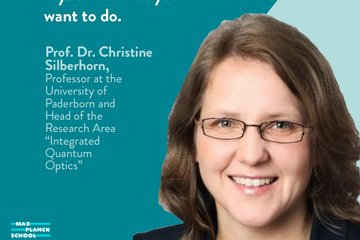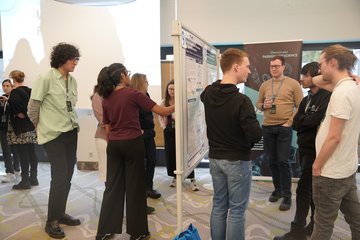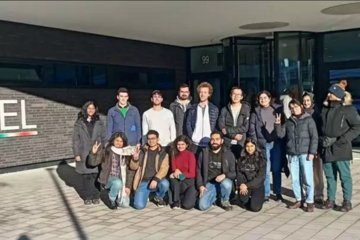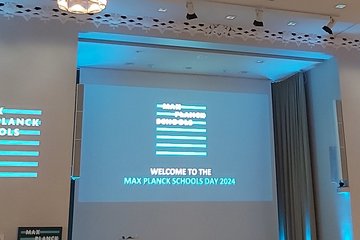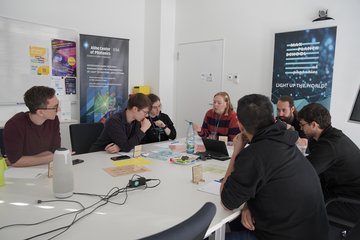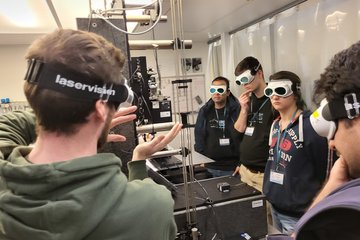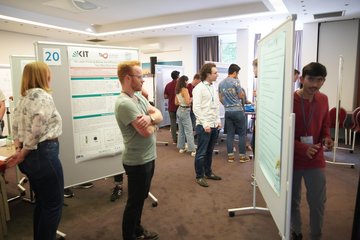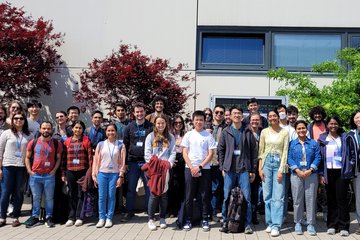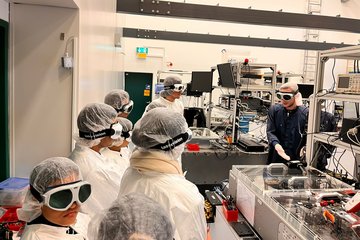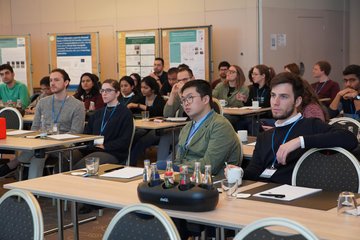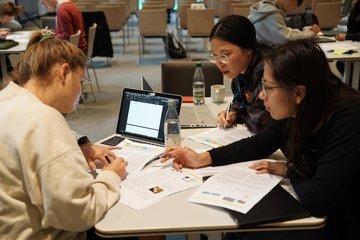MPSP Lecture Series 2023
Firsthand photonics research news - join the free lectures of our Fellows!
The science of light has just as many facets as light itself - from nanophotonics to quantum optics or strongfield physics there are countless interesting fields of research. Our MPSP Fellows, i.e. researchers, are active in many of them. At universities and non-university research institutions, they work to elicit all the secrets of light and to make it usable for mankind in a wide variety of ways.
And now you can get some insights into this research! From September to December 2023 we’ll again have an exciting MPSP Lecture Series for you (almost) every Wednesday at 5 p.m. CET (= 3 p.m. UTC | 11 a.m. EDT | 8.30 p.m. IST). A MPSP Fellow reports 45 minutes on her/his research. Afterwards, you can ask and discuss questions for 15 minutes.
The lecture series is completely free and takes place virtually via Zoom.
Past Lectures
Lecture Topic: Internal processing with ultrashort laser pulses – from dielectrics to semiconductorsUltrashort pulse laser processing has become a powerful tool for direct inscription of optical functionalities like waveguides, Bragg structures or artificial birefringence in various glasses and crystals. In addition, cutting and welding of different glasses has been demonstrated with ultrashort pulses. All these processes rely on a well-controlled nonlinear energy deposition inside the transparent material.
In this lecture, we will cover the fundamentals of the nonlinear energy deposition and discuss how to transfer this to semiconductor materials.
more
Lecture Topic: Nonlinear photonic metasurfaces and nanoresonatorsDue to their strong field confinement, nanoscale optical resonators can enhance light-matter interactions considerably already for moderate quality factors of the resonances. This can give rise to appreciable nonlinear effects. When multiple such nanoresonators are arranged in an ordered ensemble, collective resonance effects can enhance these nonlinear effects even further. Metasurfaces, being formed by a two-dimensional lattice of nanoresonators, therefore open the door to many applications relying on nonlinear light generation or manipulation. In this lecture I will introduce to the basic effects, the typical materials and technological constrains as well as some application examples.
more
Lecture Topic: Fluorescence Imaging at the Angström ScaleThe lecture will describe the initial demonstrations of quantitative intra-molecular distance measurement capabilities with MINFLUX fluorescence nanoscopy, in the FRET (Förster resonance energy transfer) range and below, down to Angström distances. MINFLUX localization, pioneered and developed by Stefan Hell and his laboratory, achieves unique measurement precisions of single molecules.
Research Topic: Nanoscopic Analysis of Neurodegenerative Disease ProteinsDr. Steffen J. Sahl researches at the Max Planck Institute for Multidisciplinary Sciences in Göttingen. His research interests are in biophysical imaging and spectroscopy at high resolution and sensitivity, in particular the further development of super-resolved fluorescence microscopy (nanoscopy), and applying these methods to analyze the intracellular pathogenic events involving aggregation-prone proteins and their fragments in neurodegenerative disorders, notably Huntington's and prion diseases
more
Research Topic: Optical Systems, Computational Optics, EUV-TechnologyProfessor, theoretical physicist and mechanical engineer with specialization in optical technology, photonics and numerical modeling. Holly studied mechanical engineering and physics at RWTH Aachen University and received his PhD in April 2019 from the RWTH Chair of Laser Technology LLT. In 2017, he joined TRUMPF Photonics in Cranbury, USA, where he worked on semiconductor laser development with focus on modeling of high-power diode lasers. In 2021 Prof. Holly became new head of the RWTH Chair for Technology of Optical Systems TOS, and since October 2022 he is the Head of Department Data Science and Measurement Technology at Fraunhofer ILT.
more
Lecture Topic: Photonics for Climate. Nanophotonic instruments to analyse the atmosphereClimate change is one of the most pressing problems of our time. In order to better understand and regulate these processes, we must be able to measure the composition of the atmosphere at any place and at any time. Above all, the quantitative measurement of trace gases such as CO2, nitrogen oxides, water vapour and methane is a major metrological challenge that can only be solved by high-performance spectrometers, such as those used in ESA's Sentinel programme. Nanostructured gratings and complex setups with gratings form the heart of the instruments. Using the ESA mission CO2m as an example, I discuss Jena's contribution to optical instruments and show that large, lithographic structures that enable the control of light on the scale of nanometres are a key element for modern high-performance optics.
more
Prof. Dr.-Ing. Michael Schmidt has held the Chair of Photonic Technologies at Friedrich-Alexander-Universität Erlangen-Nürnberg (FAU) since it was founded in 2009. In 2002 he completed his doctorate on the subject of "Process control for laser beam spot welding in electronics production" and became then a member of the board of directors of Bayerische Laserzentrum GmbH, which he has been managing director since January 2005. His current research interests include laser applications from the microscopic to the macroscopic scale in the fields of industrial manufacturing, additive manufacturing and medical technology.
more
Lecture Topic: Physics with Big LasersProf. Karsch is a group leader of “High Field Lasers and Applications Group (HiFLAG)”. His group works on high-power laser development, electron and X-ray sources, as well as applications of these sources. Prof. Stefan Karsch's "High Field Lasers and Applications Group (HiFLAG)" encompasses three major research directions: 1. Operation and development of high-power laser systems. 2. Laser-driven electron acceleration. 3. Laser-driven X-ray sources and their applications.
more
Lecture Topic: Parametric amplification of few-cycle laser pulsesThis lecture covers a wide range of topics from the basic concepts of nonlinear optics to topical waveform synthesizer systems. The different types of pumping technology are introduced and compared. The spatio-temporal pulsing dynamics during parametric amplification is analyzed. Design criteria are given and selected applications are discussed.
more
Lecture Topic: The quest for the ultranarrow nuclear resonances in the x-ray regimeThe extremely high spectral resolution of nuclear transitions can be used for applications in extreme metrology, for instance for development of a nuclear clock superior to the state-of-art atomic optical clocks or for interferometry with utmost sensitivity. The major advantage of nuclear transitions is a much smaller sensitivity to frequency shifts from electromagnetic fields as compared to atomic transitions. This qualifies nuclear transitions for testing of fundamental principles of physics, including temporal variation of the fundamental constants. In this Lecture I will report about new experimental opportunities in this field at X-ray laser sources.
more
Lecture Topic: Molecular-plasmonic Hybrid Systems in External Light FieldsThe excitation of collective electron dynamics inside the metallic nanoparticles induced by external light fields leads to strongly re-shaped electromagnetic nearfields with a complex spatial and temporal profile. The interaction of these modified and enhanced nearfields with systems located in close vicinity to the metallic nanoparticle is the origin of many astonishing physical and chemical phenomena, such as the formation of new quasi-particles, new mechanisms for chemical reactions or the ultra-high spatial resolution and selectivity in molecular detection.
more
Lecture topic: Quantum- and nano-optics with tunable microcavitiesOptical microcavities are a powerful tool to enhance light-matter interactions. This enables applications ranging from ultra-sensitive spectroscopy and sensing to quantum information. To achieve large cavity enhancement on a flexible platform, we have developed microscopic Fabry-Perot cavities based on laser-machined optical fibers.
In the context of sensing, we use microcavities for imaging and spectroscopy applications, as well as for sensing of dynamic properties of individual nanosystems. We have developed scanning cavity microscopy as a versatile method for spatially and spectrally resolved maps of various optical properties of a sample with ultra-high sensitivity. Simultaneous enhancement of absorptive, dispersive, and scattering signals promises intriguing potential for optical studies of nanomaterials, molecules and biological nanosystems.
For quantum information applications, we employ such cavities to realize efficient readout of individual spin-bearing quantum emitters by means of Purcell enhancement of fluorescence emission. We study solid state quantum emitters such as NV centers in diamond and rare earth ions, with the goal to realize a quantum repeater for long-distance quantum communication, and optically addressable multi-qubit registers for quantum computing nodes.
more
Research Topic: Photonic integrated circuits, silicon photonics, guided waves, electronic-photonic integrated systems, heterogeneous integrationJoyce Poon is a Director at the Max Planck Institute of Microstructure Physics, Professor of Electrical and Computer Engineering at University of Toronto, Honorary Professor in the Faculty of Electrical Engineering and Computer Science at the Technical University of Berlin, and Affiliate Scientist of the Krembil Research Institute in Toronto. She and her team specialize in integrated photonics on silicon for computing, communications, and neurotechnology. Ph.D. and M.S. in Electrical Engineering from the California Institute of Technology in 2007 and 2003 respectively. B.A.Sc. in Engineering Science (physics option) from the University of Toronto in 2002. Appointed Assistant Professor of Electrical and Computer Engineering at the University of Toronto in 2007. Director at the Max Planck Institute of Microstructure Physics since 2018. Fellow of the Optical Society.
more
Research Topic: hybrid quantum photonic devicesAt Paderborn University, Prof. Dr. Klaus Jöns heads up the “Hybrid Quantum Photonic Devices” working group, which focuses on the development of novel components for photonic quantum technologies, with a particular focus on quantum communication and computing applications.
more
Lecture Topic: Non-invasive cross-sectional imaging with nano-scale resolutionWe will start with learning about optical coherence tomography, a really beautiful imaging method that you already may have encountered as a patient in an ophthalmologists office. In my lab, we have developed a setup for coherence tomography in the extreme ultraviolet spectral region. While your eye doctor would take cross-sectional images of your retina with micrometer resolution, we look into, e.g., silicon samples and detect and characterize buried structures with nanometer resolution.
more












